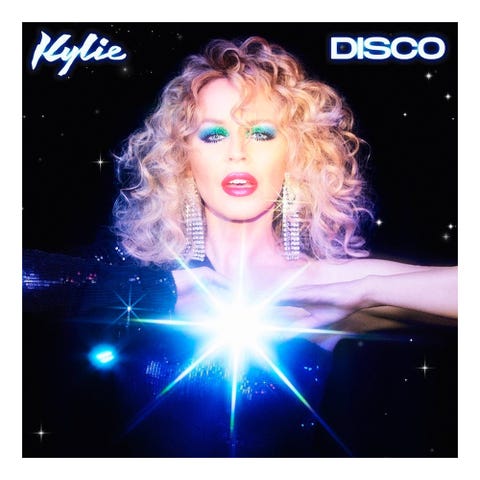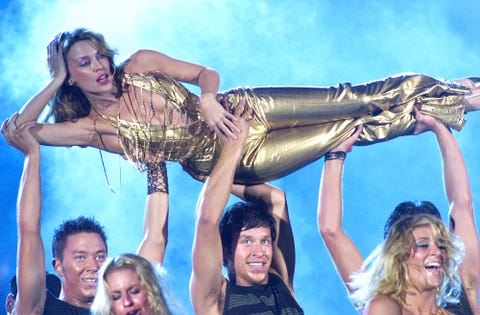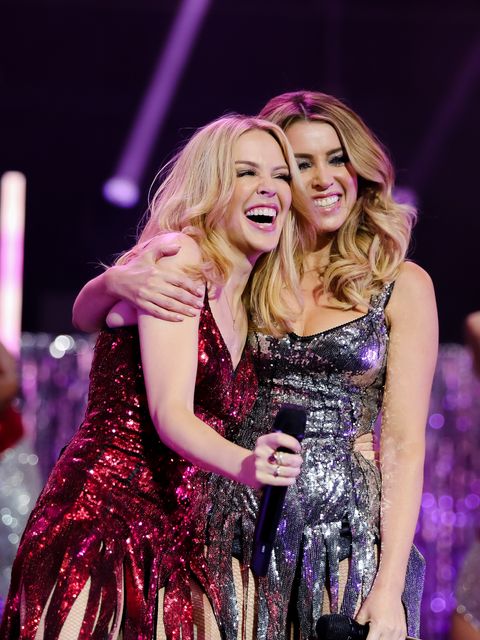You could say Kylie Minogue is the hardest-working woman in the music industry. In her 33-year career, she’s had two Billboard top 10 tracks, seven No. 1 hits, and 17 albums
rank in the top 10 in the U.K. The highest-selling female Australian artist of all time, Kylie (sorry to the other KYLIE), now 52, has come a long way since inventing party anthem “The Loco-Motion” in 1988. The soap star-turned-pop icon is a master at revamping her sound from dance all the way to country, and she's known for crafting an earworm or two. Think the dance-pop juggernaut “Can’t Get You Out of My Head”: Like the crush Minogue’s pining for, it's probably been stuck on rotation in your own head since 2001.
Two years since the release of her country-tinged pop project Golden, Minogue once again enters a new phase with Disco, her latest studio album. Joining the 2020 pop disco revival started by Dua Lipa and Jessie Ware, Minogue has crafted a bevy of contemplative, dance floor-ready tracks that recall her retro-imbued albums Light Years (2000) and Fever (2001). With lead single “Say Something,” Minogue provides a balm for the lonely days of quarantine: “We're a million miles apart, in a thousand ways / Baby, you could light up the dark, like a solar scape,” she sings with a candy-coated lilt.

Disco delivers exactly the kind of optimism people need in 2020. “I think a lot of my songs and a lot of the songs on Disco are about togetherness, and that dream of good times, acknowledging they're not all great times,” Minogue says. Phoning in from her home in London, she speaks with ELLE.com about how quarantine affected the making of the album, the new wave of disco pop, and her dream future collaborators.
Why was it important to mix wistfulness with hope on the record?
I think that's one of my happy places. "All The Lovers" is like that, which is from 2011. In "Can't Get You Out of My Head," there's a longing and a plaintive cool within that. It's enough to drive me crazy: You can't shake the idea of this person. That, to me, is a no-brainer. That's a place I like to go to, to try to illustrate that, especially lyrically within a song. There's other songs on the album [where] really it's like, we're just having a good time. There's really no storyline other than "this is the dance we're doing." I'm not afraid to do that.
What made "Say Something" the ideal lead single?
I think “Say Something” has some melancholy to it for sure. Lyrically, for a start, it seemed to make sense and connect with people. Everyone has hard times, so how do you navigate that? How do you find the joy within that? Some of the other tracks go into more of a disco leaning [feel], especially “Magic,” the second single.
Tell me the story behind "Magic."
I'm not pulling a rabbit out of a hat. It is about that magical feeling and the sparks of falling in love, finding a person, the person, the people, however you roll—finding that connection with someone. That does seem like magic sometimes. We read about it, we write about it, there's paintings. Just about anything you look at goes back to love and the human desire to have that in some way, shape, or form.
I heard you made part of the record before COVID-19 and the rest of it during quarantine.
I started on the album last year and carried on early this year. My last gig was in São Paolo and the date is etched in my brain, March 6, because the weeks leading up to that, I was speaking to my management every day saying, "Is this still on? Is this still happening?" It did happen, and it was fantastic, but that was it. That was the last gig I did. Then I was back in various studios and hit my stride with different writers and producers: We think we've got this disco thing. We know the lane we're supposed to be in. I was going all day, every day, and then lockdown happened.
What was that transition like for you when quarantine hit?
I thought, how can we keep doing this? I took baby steps using GarageBand, which I'd never used before. Then thought, okay, I've got to get serious: auditing all the equipment, setting up a home studio, and learning the basics of Logic to at least be able to record my vocals and do remote recording sessions. It took some getting used to. Everyone being in their houses, all my collaborators, some of them with children, they'd say, "Well, I could do 1:30 p.m. to 3:30 p.m. Then I've got to put the kids down." Someone would have a Wi-Fi problem, there'd be buffering issues. There'd be challenges, but every day one of us would say, "We are so thankful to be able to do this, stay creative, keep working."
How did you approach making Disco differently than Golden?
Oh, quite differently. Golden was about songwriting and going back to basics. I think having a piece of country was delving into that world and finding a way to have that make sense with my pop sensibility.
It meant so much to me to try to understand the past couple of years. I had a breakup, and it's not about him, it's about me. It was that age-old story of trying to understand what happened and how I felt about it. So, on that level with songwriting, there were themes that are universal. I definitely haven't forgotten any of the lessons. And by osmosis, going to Nashville and learning more about songwriting, something changes [in you]. Everybody talks about it when they've been to Nashville. I've joined the fan club because my time there was incredible.
This year, we've been seeing a disco revival in pop with Lady Gaga, Jessie Ware, and Róisín Murphy, to name a few. Dua Lipa has referenced your older work as well. What do you think accounts for the shift to disco liberation in pop?
I'm asking the same question because it's in the air. I think Dua started her album last year. I started mine last year. I don't know that anyone knew that anyone else was doing disco or going down that path, yet we have to talk about it this year. So, why is it happening? Why is it so relevant? I don't entirely know the answer to that. Firstly, it's got to be that pop is cyclic. The music we hear veers toward something else in time. There's a moment in the world now where people want or are enjoying some escapism. I have my own personal reasons for how I ended up having disco as the thing for this album, but it had nothing to do with 2020. It's just ideas and actualities colliding.
Why do you think there's so much power in pop music, especially this year? We've gotten some really incredible pop albums.
Maybe people are more receptive to it at the moment, or the desire for music and to appreciate. I think we're appreciating the day, whether it's a beautiful, sunny day or in London today, the weather has just turned. I can't speak for everybody, but it seems that collectively, if I can generalize, we're grateful for much smaller things that we would have taken for granted before. We haven't been through this before. It certainly feels like music is one of the things that can connect and unite people, as it always has been, but this year is a year like no other for us.

It's been 20 years since Light Years came out. Do you have any untold stories about the making of that record?
I just stopped myself swearing there. Twenty years, wow. Well, we certainly didn't have cell phones. There's about two photographs of the making of that album because someone had a camera with film in it.
Making Light Years was an exciting time because I'd had five years with an independent dance label, which was really important in its own way. Myself and the team, we were all on the same page: We were just going back to pop, and that's what we did. The first thing I would think of is "Spinning Around," of course, but also working in Dublin with Biff Stannard, who I did "Say Something" with. That was the start of a long-term relationship. Even my current A&R, the first time I met him was to sign that contract to that label. The gold pants are symbolic of that time. Just gold pants and the "Spinning Around" video. It was a shiny new start. It was strong and the planets were aligned.
Do you have any dream collaborations at this point in your career?

I've done quite a lot of collaborations over the years—I absolutely love doing them because you get to dip your toe into different water and color your performance by the other artist. There's an unspoken understanding and camaraderie. Certainly, I'd love to collaborate with more women, because I haven't done much of that. You could say any of the top girls right now: Dua is definitely having a great time. Lady Gaga. I love Miley [Cyrus]. I admire so many of these women. There's been talk about my daughter and I doing a duet for, it feels like, 20 years. If that were to happen, that would be amazing. I was dressing up in my bedroom to Madonna, to Whitney Houston, to Cyndi Lauper, and then Fleetwood Mac, ABBA, and Donna Summer. Diana Ross was going to go on tour this year and she had to cancel that. There's so many people I would jump at the opportunity to work with.
Have you started thinking about what your next record would sound like? Is there a certain direction you might take?
I haven't thought about the direction, but I have thought about writing again. Maybe that's because the schedule isn't like it's been for every other album of my entire life, where you're flying around to different cities and different countries. Now that I've got my setup at home and you can do remote writing sessions and recording sessions, there's a little bit of me thinking, I'd just love to write more music. I don't know what that would be. Now there's quite a lot of promo to do. If I had the option to dive in and song-write for another couple of weeks, I'd leap at it. It's something I love doing—and you don't have to get out of your track pants.
